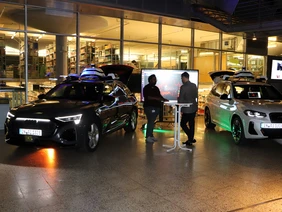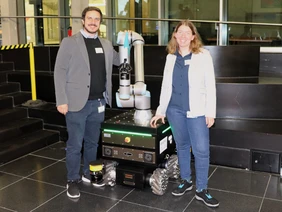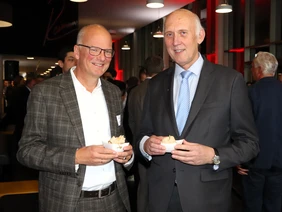The self-cleaning robot R10D10, the research vehicles Sissi and Franz equipped with innovative sensor technology, and other exhibits attracted the attention of over 150 guests in the auditorium of Ingolstadt University of Applied Sciences. These and many other demonstrations emphasised the breadth and depth of the AImotion Bavaria Institute's research work and offered visitors a fascinating insight into the world of AI.
Over the past four years, the AImotion Bavaria Institute has developed into an important driver of innovation in the region. The institute's research projects cover a broad spectrum of topics and fields of technology. In addition to focal areas of mobility such as autonomous driving, unmanned flying, and traffic flow control, the scientists are also working on digital production, digital trade, and medical applications.
These fields of application are complemented by basic research into AI technologies such as computer vision and speech processing, always with the aim of maximising the direct benefits for society. This approach is also reflected in the active transfer of research results into practice and the examination of ethical issues relating to artificial intelligence.
THI President Professor Walter Schober emphasised: ‘The appointment as an AI hub as part of the Hightech Agenda Bayern, which is unique in Europe, is a special honour for THI. With currently 110 scientists, we are an important AI hub in Germany.’
Professor Michael Botsch, Scientific Director of AImotion, emphasised the diversity of current projects, including urban air mobility, autonomous driving, and digital production. He particularly highlighted the AI centre's flagship project.
Dr Christian Lösel, Managing Director of AImotion, presented the institute's participation in the International Building Exhibition of the European Metropolitan Region of Munich, to which Ingolstadt belongs, under the motto ‘Spaces of Mobility’.
After the speeches, the guests took the opportunity to experience the innovative projects firsthand in the auditorium. Four years after its foundation, the AImotion Bavaria Institute is proving that it not only develops leading AI solutions but also positions Ingolstadt as a forward-looking technology centre - a success story with prospects.




![[Translate to English:] Logo Akkreditierungsrat: Systemakkreditiert](/fileadmin/_processed_/2/8/csm_AR-Siegel_Systemakkreditierung_bc4ea3377d.webp)








![[Translate to English:] Logo IHK Ausbildungsbetrieb 2023](/fileadmin/_processed_/6/0/csm_IHK_Ausbildungsbetrieb_digital_2023_6850f47537.webp)


